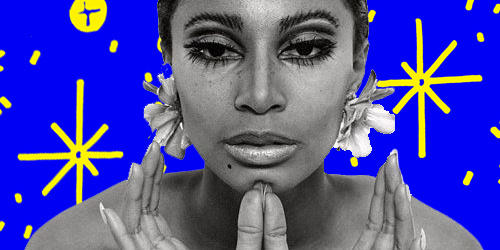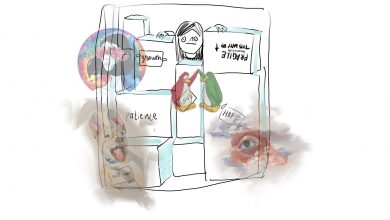Afrofuturism and Binti: A Different View of Black Future

Image by Maddy Pease
Afrofuturism is loosely defined as a cultural aesthetic and a philosophy that reimagines African tradition and Black future through speculative work and critical theory. In contrast to traditional presentations about the future of Blackness and racial diversity, Afrofuturism centralizes the possibilities of Black life and Black imagination. It intertwines futuristic ideas about technology and innovation with diverse African and diasporic narratives. The label “Afrofuturist” didn’t exist until 1994, when it was coined in an academic essay titled “Black to the Future” about Black science fiction creators, but “Afrofuturism” now refers to a long history of work unified by its exploration of Black future.
Afrofuturism is present in a broad swath of artistic work, from the literature of Octavia E. Butler and Maryse Condé, to the music of Janelle Monáe and Ibeyi, and the art of Ellen Gallagher and Cyrus Kabiru. Each of these works takes Afrofuturism in different ways and explores the future of Black culture. Yet, Afrofuturism also extends to cultural criticism and scientific work that redefines the past and future of race.
Afrofuturism can be seen as a counter-narrative to traditional, typically white hegemonic science fiction, particularly that which “others” aliens and projects a xenophobic and colonial future. However, it would be more accurate to say Afrofuturism is an entirely different version of science fiction.
As Afrofuturist author Nnedi Okorafor has said, Afrofuturism has an entirely separate foundation from white hegemonic work. Afrofuturism has bloodlines in Africa and the experiences of the African diaspora, and presents a different vision of what the future can or should be. While hegemonic society is eager to label anything speculative produced by non-white people as “magical realism,” Afrofuturism is driven by Black people in charge of their own narratives.
Much of Okorafor’s creative work centers around Africa. She sees many Afrofuturist works as being too rooted in American culture, and champions Africa-based sci-fi. Okorafor is Nigerian American, and cites her childhood visits to Nigeria as central to her decision to write as a young girl and her presentation of the world in her developed science fiction.
Binti, Okorafor’s most highly acclaimed novella, was published in 2015 as part of a trilogy of work. It has won both the Hugo and Nebula awards for novella, two of the most prestigious awards in science fiction.
The novella follows a young girl of the same name, who’s part of the ethnic group “Himba.” She is the first Himba person ever accepted to the prestigious Oomza University, but accepting her place at the school means leaving her family behind and exposing herself to a world that does not understand her customs. At the same time, Binti must navigate tensions between Oomza University and Meduse, a violent alien race that have been warring with some of the humans on Earth for a long time.
Binti is a struggle of independence and self-trust. At times it seems Binti will be unable to continue her journey, or that in order to forge the life she seeks for herself, she must cut herself off from parts of her identity and the very earth that bore her. Sometimes Binti appears too removed from what Oomza University represents, and other times, too close to it. Through this struggle, Okorafor provides a nuanced commentary on identity and growth. As Okorafor said in a TED Talk about the book, “as the story progresses she becomes not other but more. This idea of leaving, but bringing and then becoming more is at one of the hearts of Afrofuturism.”
Despite its appearance of simplicity, Binti provides incredibly complex commentary on several aspects of contemporary life, like militarism, colonialism, growth and reconciliation. In total, Binti is a brilliant, engaging work, providing an exceptional example of what science fiction can be.
It is far past time to take in the brilliant creations of Afrofuturist artists like Okorafor. We ought revel in the worlds that Binti and Afrofuturist work present, but, more significantly, we must amplify further the reimagination of diasporic narratives. Afrofuturism is the future. Listen to it.



